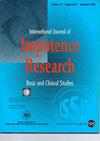Sildenafil: an orally active type 5 cyclic GMP-specific phosphodiesterase inhibitor for the treatment of penile erectile dysfunction.
Abstract
Sildenafil (Viagra, UK-92,480) is a novel oral agent under development for the treatment of penile erectile dysfunction. Erection is dependent on nitric oxide and its second messenger, cyclic guanosine monophosphate (cGMP). However, the relative importance of phosphodiesterase (PDE) isozymes is not clear. We have identified both cGMP- and cyclic adenosine monophosphate-specific phosphodiesterases (PDEs) in human corpora cavernosa in vitro. The main PDE activity in this tissue was due to PDE5, with PDE2 and 3 also identified. Sildenafil is a selective inhibitor of PDE5 with a mean IC50 of 0.0039 microM. In human volunteers, we have shown sildenafil to have suitable pharmacokinetic and pharmacodynamic properties (rapid absorption, relatively short half-life, no significant effect on heart rate and blood pressure) for an oral agent to be taken, as required, prior to sexual activity. Moreover, in a clinical study of 12 patients with erectile dysfunction without an established organic cause, we have shown sildenafil to enhance the erectile response (duration and rigidity of erection) to visual sexual stimulation, thus highlighting the important role of PDE5 in human penile erection. Sildenafil holds promise as a new effective oral treatment for penile erectile dysfunction.





